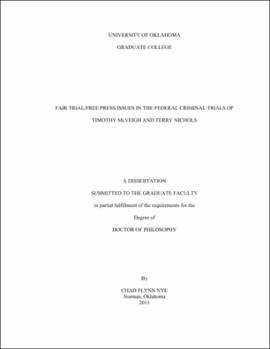| dc.contributor.advisor | Beard, Fred | |
| dc.creator | Nye, Chad Flynn | |
| dc.date.accessioned | 2019-06-03T20:35:29Z | |
| dc.date.available | 2019-06-03T20:35:29Z | |
| dc.date.issued | 2011 | |
| dc.identifier | 9965705002042 | |
| dc.identifier.uri | https://hdl.handle.net/11244/320208 | |
| dc.description.abstract | This study examines fair trial/free press issues involved in the federal criminal | |
| dc.description.abstract | trials of Timothy McVeigh and Terry Nichols for the 1995 bombing of the Alfred P. Murrah Federal Building in Oklahoma City, Oklahoman. The bombing case attracted intense press coverage resulting in conflicts between the First Amendment right of the press to cover court proceedings and the Sixth Amendment right of the defendants to receive a fair trial before an impartial jury. In resolving the fair trial/free press conflicts, the courts managing the case made several decisions deserving examination. These decisions included a rare federal change of venue, a decision to seal hundreds of case documents, and a decision to impose orders restricting out-of-court statements on two different occasions. The change of venue decision had ramifications that made the bombing trials a truly unique episode in American justice. In response to the change of venue, Congress passed legislation allowing for closed-circuit broadcasts of the trial. Thus the Oklahoma City bombing trials became the first, and to date the only, federal criminal trials with a live camera presence. The Oklahoma City bombing trials were important episodes in American legal history; however, the literature suggests the trials, and specifically the fair trial/free press issues implicated in the trials, have remained relatively unexplored. | |
| dc.description.abstract | This study employed historical methods to evaluate primary source materials. Primary sources consisted of court documents, contemporaneous press reports, and oral history interviews with defense attorneys Stephen Jones and Michael Tigar. The study identified 12 major fair trial/free press issues present in the Oklahoma City bombing case. The study explains how those issues emerged, how the courts resolved those issues, and how the courts' resolution of those issues affected management of the trials. This study also explains how the unprecedented closed-circuit broadcasts became a part of the trials and how the trial court managed the closed-circuit broadcasts. | |
| dc.format.extent | 370 pages | |
| dc.format.medium | application.pdf | |
| dc.language | en_US | |
| dc.relation.requires | Adobe Acrobat Reader | |
| dc.subject | Free press and fair trial | |
| dc.title | Fair Trial/Free Press Issues in the Federal Criminal Trials of Timothy McVeigh and Terry Nichols | |
| dc.type | text | |
| dc.type | document | |
| dc.thesis.degree | Ph.D. | |
| ou.group | Graduate College | |
